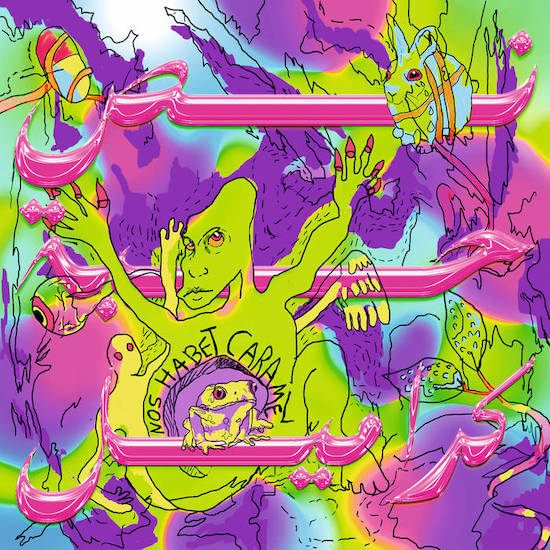As a music journalist, you’re constantly reminded of the importance of collectives and labels operating on the fringes of contemporary dance music. In the case of Cairo-based producer, DJ and multidisciplinary artist El Kontessa, it’s the Egyptian label irsh, run by ZULI and Rama, which provided a platform for her creative flourishing. After a tentative remix of a ZULI track in 2020 and a track on a low income $quad V/A release, she gained traction by appearing on two did you mean: irish compilations, which put her on Cairo’s musical map.
El Kontessa’s artistic trajectory has been clearly influenced by her community. Apart from irsh, the Palestinian label Bilna’es is also a significant hub for artists from the North African and Middle Eastern region. Run by artists Basel Abbas and Ruanne Abou-Rahme, its aim is to release music, web projects, publications, host performances and other artistic endeavours. Nos Habet Caramel is only their third release, with last year’s Tuqoos by Julmud landing on tQ’s AOTY list. Judging from my recent conversations with artists from the region, the cultural affinity between artists from the Mediterranean Arab world is akin to that of artists from the Balkans – united by history, a feeling of belonging to the same “peripheral zone” and a strong sense of camaraderie vis-à-vis “the centre”.
The album’s title (Arabic for “half a piece of caramel”) brilliantly translates its playful character. This is also encapsulated in the flashy, freaky cover with its amorphous alien entity, frog, rabbit and other oddities veiled in psychedelic colours. Designed by El Kontessa herself, it functions as a tongue-in-cheek counterpoint to the more rugged and distorted character of her productions. Musically, the album sits somewhere between the mahraganat deconstructions and Egyptian bass of ABADIR, Zuli and 3Phaz, the cutting-edge Arab club music of Deena Abdelwahed and Toumba, and the raw polyrhythmic jams of Hakuna Kulala’s Authentically Plastic.
What surprises me most is its not-necessarily-dancefloor-oriented nature (apart from the Jersey club-adjacent banger ‘Bingo’). The other six productions, marked by swift structural changes, tempo shifts and off-the-wall Arab vocal samples, feel more like short songs, and less like DJ tracks. They’re marked by a punk-ish urgency, and they exemplify sincere experimentalism, especially the baffling percussion-and-sample-driven tune ‘Ghaltet Meen’. The “drunken gait” opener ‘Fassel’ makes you dizzy just like some recent productions by Blawan. Elsewhere, she makes things even weirder, with radiating, laser-sharp synthlines like in ‘Mesh Marshmellow’ and ‘Moka3bat’ cutting through your eardrums. Each song has a different bent, with ‘Dofda3’ standing out as the most fast-paced and rave-y production on the record. The turn of events in the closer ‘Asanser’, switching between pensive 80 bpm IDM/downtempo and no nonsense 160 bpm d’n’b, sheds even more light on her artistic flexibility.
As a purely musical endeavour, an exercise in style, an open-ended exploration of autochthonous musical practices through a modern lens, the album represents the opposite of so many trendy concept-driven releases that came out in recent years. It’s the work of a zealous producer moulding the currently popular darbuka-infused polyrhythms and energetic mahraganat samples into a personal vision. Nos Habet Caramel isn’t a polished pearl, but more of a sonic conglomerate, rough around the edges and unruly in structure, yet possessing a distinct appeal.


